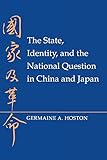The State, Identity, and the National Question in China and Japan / Germaine A. Hoston.
Material type: TextPublisher: Princeton, NJ : Princeton University Press, [2021]Copyright date: ©1995Description: 1 online resource (643 p.)Content type:
TextPublisher: Princeton, NJ : Princeton University Press, [2021]Copyright date: ©1995Description: 1 online resource (643 p.)Content type: - 9780691225418
- Communism -- Asia
- Communism -- China
- Communism -- Japan
- HISTORY / Asia / China
- Activism
- Agriculture (Chinese mythology)
- Anarchism
- Anti-imperialism
- Antonio Gramsci
- Asiatic mode of production
- Backwardness
- Base and superstructure
- Bolsheviks
- Bourgeoisie
- Buddhism
- Capitalism
- Capitalist state
- China
- Chinese nationalism
- Class conflict
- Communism
- Communist International
- Communist Party of China
- Communist revolution
- Communist society
- Confucianism
- Counter-revolutionary
- Criticism
- Despotism
- Dictatorship
- Feudalism
- For Marx
- Hegemony
- Historical materialism
- Ideology
- Imperialism
- Industrialisation
- Intellectual
- Japanese Communist Party
- Japanese nationalism
- Karl Kautsky
- Kokutai
- Kuomintang
- Labour movement
- Left-wing politics
- Legitimacy (political)
- Leninism
- Leon Trotsky
- Li Dazhao
- Mao Zedong
- Maoism
- Marx's theory of the state
- Marxian economics
- Marxism
- Marxism–Leninism
- Marxist philosophy
- May Fourth Movement
- Meiji Restoration
- Meiji period
- Mode of production
- Modernity
- Narodniks
- Nation state
- Nationalism
- Nationality
- Nikolai Bukharin
- Orthodox Marxism
- Political party
- Political philosophy
- Political science
- Politics
- Populism
- Proletarian revolution
- Radicalism (historical)
- Regime
- Revolutionary movement
- Revolutionary socialism
- Russian Revolution
- Second International
- Slavery
- Social class
- Social democracy
- Social revolution
- Socialism with Chinese characteristics
- Socialist state
- Sovereignty
- Soviet Union
- Stalinism
- State (polity)
- State capitalism
- State socialism
- Statism
- Sun Yat-sen
- The Communist Manifesto
- Trade union
- Trotskyism
- Vanguardism
- Wars of national liberation
- Western Europe
- Western world
- Withering away of the state
- World War II
- World revolution
- Writing
- 951.04
- DS775.7
- DS775.7 .H67 1994eb
- online - DeGruyter
| Item type | Current library | Call number | URL | Status | Notes | Barcode | |
|---|---|---|---|---|---|---|---|
 eBook
eBook
|
Biblioteca "Angelicum" Pont. Univ. S.Tommaso d'Aquino Nuvola online | online - DeGruyter (Browse shelf(Opens below)) | Online access | Not for loan (Accesso limitato) | Accesso per gli utenti autorizzati / Access for authorized users | (dgr)9780691225418 |
Frontmatter -- CONTENTS -- PREFACE -- INTRODUCTION Identity, the National Question, and Revolutionary Change in China and Japan -- CHAPTER ONE Marxism, Revolution, and the National Question -- PART ONE The National Question and the Political Theory of Marxism in Asia -- CHAPTER TWO The National Question and Problems in the Marxist Theory of the State -- CHAPTER THREE The Encounter: Indigenous Perspectives and the Introduction of Marxism -- PART TWO: ANARCHISM, NATIONALISM, AND THE CHALLENGE OF BOLSHEVISM -- CHAPTER FOUR Anarchism, Populism, and Early Marxian Socialism -- CHAPTER FIVE Nationalism and the Path to Bolshevism -- PART THREE: HISTORY, THE STATE, AND REVOLUTIONARY CHANGE: MARXIST ANALYSES OF THE CHINESE AND JAPANESE STATES -- CHAPTER SIX State, Nation, and the National Question in the Debate on Japanese Capitalism -- CHAPTER SEVEN National Identity and the State in the Controversy on Chinese Social History -- PART FOUR: OUTCOMES: THE RECONCILIATION OF MARXISM WITH NATIONAL IDENTITY -- CHAPTER EIGHT Tenko: Emperor, State, and Marxian National Socialism in Showa Japan -- CHAPTER NINE Mao and the Chinese Synthesis of Nationalism, Stateness, and Marxism -- CHAPTER TEN Marxism, Nationalism, and Late Industrialization: Conclusions and Epilogue -- NOTES -- SELECT BIBLIOGRAPHY -- INDEX
restricted access online access with authorization star
http://purl.org/coar/access_right/c_16ec
The first decades of the twentieth century witnessed an explosion of nationalist sentiment in East Asia, as in Europe. This comprehensive work explores how radical Chinese and Japanese thinkers committed to social change in this turbulent era addressed issues concerning national identity, social revolution, and the role of the national state in achieving socio-economic development. Focusing on the adaptation of anarchism and then Marxism-Leninism to non-European contexts, Germaine Hoston shows how Chinese and Japanese theorists attempted to reconcile a relatively new appreciation for the nation-state with their allegiance to a vision of internationalist socialist revolution culminating in stateless socialism. Given the influence of Western experience on Marxism, Chinese and Japanese theorists found the Marxian national question to be not merely one of whether the "working man has no country," but rather the much more fundamental issue of the relative value of Eastern and Western cultures. Marxism, argues Hoston, thus placed native Marxists in tension with their own heritage and national identity. The author traces efforts to resolve this tension throughout the first half of the twentieth century, and concludes by examining how the tension persists, as Chinese and Japanese dissidents seek identity-affirming modernity in accordance with the Western democratic model.
Mode of access: Internet via World Wide Web.
In English.
Description based on online resource; title from PDF title page (publisher's Web site, viewed 07. Nov 2022)


